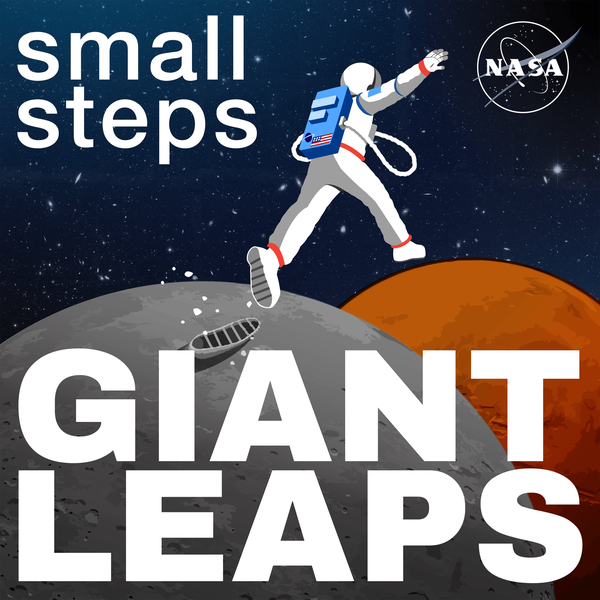
Small Steps, Giant Leaps
National Aeronautics and Space Administration (NASA)
Small Steps, Giant Leaps audio podcast episodes
- 20 minutes 44 secondsDragonfly: Mission to Titan
NASA's Dragonfly spacecraft, a rotorcraft the size of a small car, is set to explore Titan, Saturn's largest moon. Rich in organic compounds, Titan offers a rare window into the kinds of chemical conditions that may have existed on Earth long before life began.
4 March 2026, 5:27 pm - 14 minutes 4 secondsDesigning the Roadmap to Mars
Nujoud Merancy, NASA's deputy associate administrator for the Strategy and Architecture Office, talks about how NASA is developing the roadmap for Artemis missions to the Moon and beyond.
4 March 2026, 5:17 pm - 16 minutes 13 secondsThe Many Hats of NASA Engineer Jennifer Lu
From her experience working with the Commercial Crew Program, which sends astronauts to the International Space Station aboard commercial spacecraft, to the Artemis missions to the Moon, aerospace engineer Jennifer Lu shares how working with a variety of teams — including circus performers before coming to NASA — has helped her see the bigger picture.
4 February 2026, 8:24 pm - 25 minutes 59 secondsBringing Back Supersonic Flight
Currently, flying faster than the speed of sound over land is prohibited for commercial flights because it creates disruptive sonic booms. NASA's experimental X-59 plane will research how to turn those booms into "sonic thumps," about as loud as a slamming car door. Lead pilot Nils Larson explains how the X-59 could usher in the next era of commercial supersonic flight.
21 January 2026, 12:56 pm - 13 minutes 22 secondsSailing the Solar System
A solar sail uses light particles from the Sun to move through space without needing a single drop of fuel. NASA is demonstrating the lightweight technology that could open doors to low-cost missions to deep space.
17 December 2025, 6:31 pm - 15 minutes 41 secondsSimulating Moon and Mars Dust
Dr. Jennifer Edmunson explains what it takes to simulate Moon and Mars dust on Earth, and lessons learned from preparing to build habitats on other worlds.
3 December 2025, 4:54 pm - 20 minutes 37 secondsNASA's Centennial Challenges Prize Program
There’s a program at NASA that taps into the power of the public to solve some of the toughest problems in space exploration. It’s called Centennial Challenges, a prize competition that has awarded more than $24 million to hundreds of people ranging from academics, startup founders, small business owners, and independent inventors from across the U.S. and 86 countries.
19 November 2025, 3:11 pm - 22 minutes 12 seconds6,000 Exoplanets and Counting
On September 17, 2025, NASA announced that the number of exoplanets, planets outside our solar system, tracked by NASA has reached 6,000. In the three decades since the groundbreaking detection of exoplanet 51 Pegasi b, the first confirmed planet orbiting a Sun-like star, astronomers have concluded that exotic worlds are everywhere.
18 September 2025, 2:25 pm - 19 minutes 7 secondsNASA's Zero Gravity Research Facility
A steel vacuum chamber 50 stories deep at NASA’s Glenn Research Center lets researchers simulate near-weightlessness by letting test hardware freefall for 5.18 seconds.
3 September 2025, 5:35 pm - 26 minutes 58 secondsTurning Space Data Into Sound
From black holes to star clusters, scientists are turning space data into sound with a process called sonification. Dr. Kimberly Arcand, visual scientist with the Harvard-Smithsonian Center for Astrophysics, joins us to explore how data sonification lets more people experience the cosmos and give researchers a new way to interpret science one note at a time.
20 August 2025, 5:45 pm - 19 minutes 51 secondsStarBurst: Gamma-ray Hunter
StarBurst, a satellite the size of a washing machine, aims to detect the initial blast of gamma-rays, the most powerful bursts of energy in the universe. These huge explosions can occur when dense neutron stars collide, forging metals like gold and platinum. These metals are some of the building blocks of planets — like Earth.
6 August 2025, 2:02 pm - More Episodes? Get the App